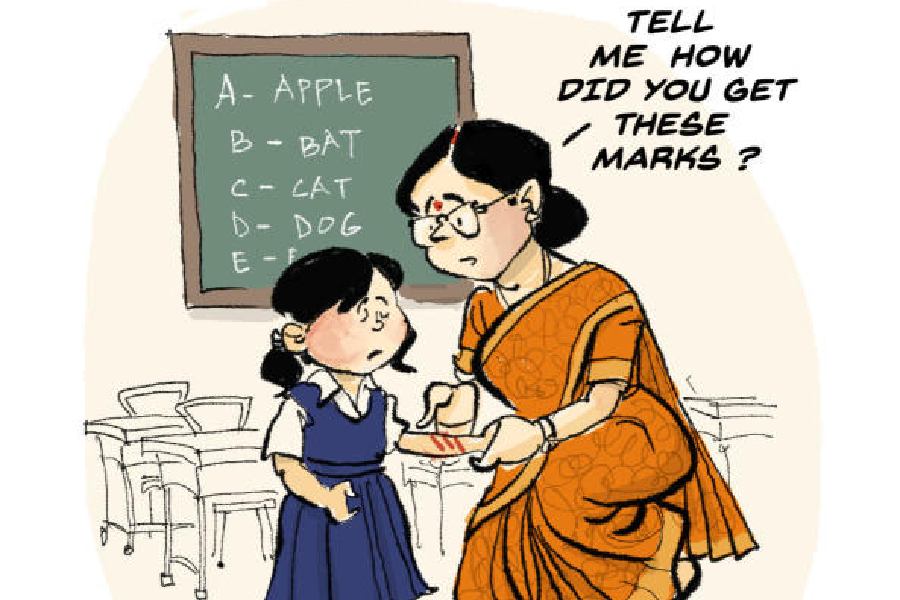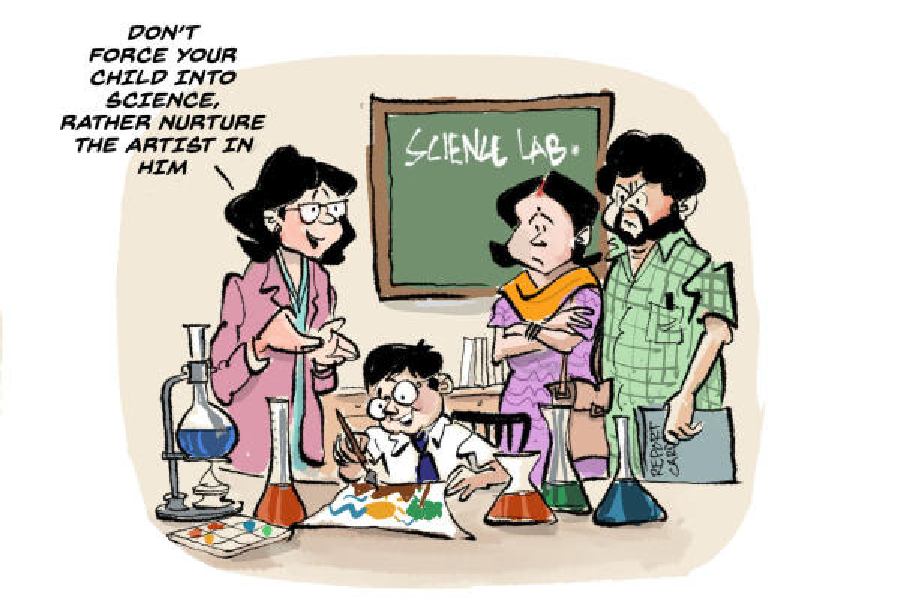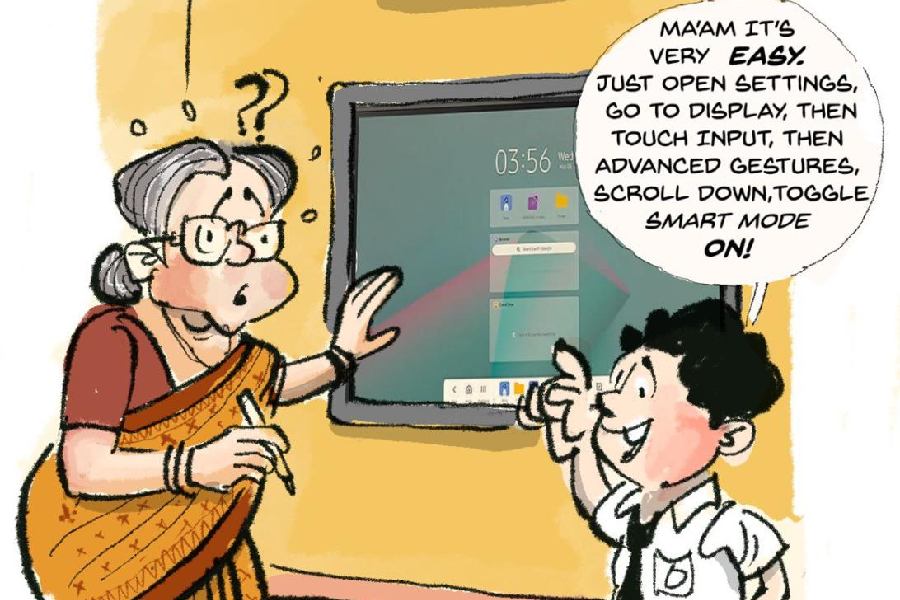The 21st-century teacher must to do far more than simply deliver lectures in her subject. She must use AI and create PowerPoint presentations for smart boards, stay updated on child protection laws such as POCSO and may even have to support and counsel students battling personal problems.
“Initially, many teachers were afraid of technology, but the pandemic forced us to embrace it through online classes. We gained confidence after that and now many are using smart boards and the like. It’s a bit of a challenge to learn but we have workshops for them and they make teaching easier,” said Sudeshna Seal, an AD Block resident who has been English teacher and now is now the principal of Loreto Day School, Dharamtala.
At The Newtown School, teachers are given training and mock drills before going live with new technology. “New gadgets are introduced at the beginning of academic sessions and we get 15-20 days of hands-on practice with them,” says Darshana Banerjee, a junior section teacher there and resident of GD Block. “For instance, we have replaced whiteboards with interactive panels that are like giant computer screens. We can go online with them as well as use a stylus to write on them using different colours. Learning these is part of a teacher’s job today as they break monotony for children.”
Letter of the law

The West Bengal Association of Private Affiliated Schools recently held an online workshop on the Protection of Children from Sexual Offences (Pocso) Act. The session was conducted by Ajay Chopra, secretary and administrator of St Francis Xavier School (SFXS).
“Such topics are covered in B.Ed courses, but we need refresher sessions time and again to keep educators sensitised,” said Chopra, joint secretary of the association who is also a lawyer.
He outlined the provisions of the Act and emphasised its severity. “The Act is gender-neutral – the accused and the victim can be boys, girls, or transgender. The minimum punishment is 10 years in prison. If the victim is below 16, the minimum increases to 20 years. The maximum sentence can be imprisonment until the end of the convict’s life,” he explained.
“This Act also follows the principle of reverse burden of proof — the accused is presumed guilty until proven innocent. An attempted crime is punishable, anyone abetting the crime is culpable, and if you come to know of such a crime, failure to report it is also punishable,” Chopra added. “If not the police, report the matter to Childline on 1098 and they will alert the authorities.”
Anil Srivastava, principal of SFXS, shared a personal experience from a previous school. “A teacher came to me with a girl who had cut marks on her arm. On being prodded, she confessed to being abused at home. I informed the police, but her parents tried to hush up the matter by claiming she was lying. We resisted and backed the girl through the court case and now she’s living a normal life,” he said.
“Workshops like these are essential so schools know how to react in such cases. They especially need to know that it is punishable to not report it,” said Srivastava. But alongside legal workshops, the school also holds sessions on topics like empathy.
“The other day, I received a letter signed by 30 to 40 students in a class, saying they were disturbed by a boy with special needs. I spoke to the child, who was completely unaware that his behaviour was affecting others. I discussed it with the school counsellor, sent the boy to the library, and went into the class,” he said. “I explained to them empathy, sympathy, and apathy. They understood and withdrew their complaint. This may not be traditional teaching, but it is very much a part of our job.”
Teaching teachers
Sri Aurobindo Institute of Education recently conducted a session in which counsellors were invited to advise teachers on the growing issues they observe among students – depression, feelings of rejection, mobile addiction, aggression, abusive language, absenteeism, and lack of concentration.
The most poignant was when principal Anthony Das spoke of two students who had committed suicide the previous year. “In one case, no one could understand why she did it. In the other, it was because the boy was being forced by his parents to study science when he wanted to pursue history,” he said.
“We try to talk to such parents, but they think they know best,” Das added. “The fathers hold respectable positions in society, and the mothers who have sacrificed their careers expect their children to take up science in return.”
Another teacher recounted receiving a text from a preschooler’s mother, asking that her child not share tiffin with a student of a different religion. Yet another teacher shared that a Class II girl’s mother insisted her daughter not sit beside a boy.
Counsellor Sunanda Mazumdar advised teachers to take a naughty student aside and scold him away from the class. “Ask them to elect a monitor as they are more likely to listen to someone they chose. Use the monitor to control them,” she suggested.
To show parents that science isn’t the only lucrative career path, another counsellor, Gopa Kar, advised citing successful professionals from different fields. “Tell them how Anupam Roy completed his engineering but still returned to music as that was his passion,” she said.

A teacher at the school, felt such workshops were essential. “Child psychology is taught in B.Ed courses, but that is theory. It’s a different ball game when you’re handling 40–50 students and rushing to finish a vast syllabus,” she said. “There is no time to spot or work on individual children’s psychological needs. We’re often overwhelmed by demanding parents too. One parent keeps pushing her child towards math and science Olympiads when the child is clearly more interested in art and craft. Many students in Classes XI and XII take science only under parental pressure.”
Help at hand
Tilottama Mallik, head of DPS Megacity, noted that these issues are not new. “Such problems have existed across generations of schooling, but now we have solutions. Our school is governed by the DPS Society and CISCE Council, both of which conduct regular training workshops for teachers on pedagogical tools, mental health, and more.”
Jude Baptist, the junior school headmaster, believes the key is to focus on teaching — not subjects but — children. “We had a Class II student whose father had succumbed to Covid. He was deeply disturbed, even hallucinating. I met him weekly and shared my own experience of losing my mother as a boy. I told him that some children have lost both parents. Gradually he has improved. Teachers must be role models,” he said. “In fact, teaching is the one profession AI can’t replace as the human touch is needed here more than anything else. But we must keep evolving to meet our students’ needs. Harsh punishments, for instance, no longer work and we must melt them with love instead.”
Psychologists are empathetic towards the challenges faced by teachers today. Smaranika Tripathy, who has served as school counsellor for years, believes new teachers should receive an orientation from school counsellors. “Workshops mandated by Boards are usually attended just to land the certificate that will get them promoted, but junior teachers also need practical guidance from senior colleagues. Schools must understand that if the teacher is happy, students will be too. Once a year, give teachers a platform to showcase their creativity or plan outings for them,” said Tripathy, a clinical and rehabilitation psychologist at Manipal Hospitals and Belle Vue Clinic.
“The first step to teaching should be through friendship. If a child doesn’t like you, they won’t like your subject. Parents and teachers should spend time together to understand the child and there should be one period each week where the teacher talks to students without teaching a subject. If a problem arises, the class teacher should seek advice from the counsellor and try to solve it herself as she has a rapport with the student. Only if that fails should the child be referred directly to the counsellor,” said Tripathy, a resident of Green Vista in New Town.
Chirasree Mitra, a psycho-social counsellor, feels teachers should not be burdened with full-time counselling responsibilities. “They are already overwhelmed with the syllabus and corrections. It is enough for them to identify symptoms. Schools should hold workshops to train teachers to spot red flags and refer cases to professionals.”
She listed signs of distress — a child persistently isolating himself, avoiding interaction, speaking in a low voice, avoiding eye contact, fidgeting with his hair or uniform, biting nails, or showing poor hygiene like unkempt appearance, body odour, or dirty nails. “These are signals that should not be ignored,” says the AD Block resident.










